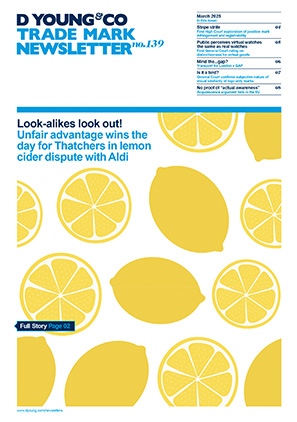A demand letter does not, by itself, interrupt 5-year acquiescence period
Heitec AG (HAG) owned a 1998 European trade mark (EUTM) for HEITEC dating from 1998. Heitech Promotion GmbH (HPG) owned a 2002 German trade mark containing the words HEITECH PROMOTION. Its first use of HEITECH was accepted as 2004
Heitec AG (HAG) owned a 1998 European trade mark (EUTM) for HEITEC dating from 1998. Heitech Promotion GmbH (HPG) owned a 2002 German trade mark containing the words HEITECH PROMOTION. Its first use of HEITECH was accepted as 2004
In 2004, HPG contacted HAG for coexistence. In 2008, HAG became aware of HPG’s application for a mark containing the word HEITECH. In 2009, HAG sent a demand letter to HPG requesting use of HEITECH cease. HPG again suggested coexistence.
In 2012, HAG initiated court proceedings in Germany. Due to various issues with the filing of the proceedings, notification of the legal action was only served on HPG on 23 May 2014.
HAG claimed HPG had infringed HAG’s rights in HEITEC and (amongst other things) requested payment for the costs of sending the demand letter to HPG. HPG was ordered to pay HAG for the costs of sending the demand letter but all other claims were rejected.
HAG’s appeal in respect of the rejected claims was denied on the grounds it had acquiesced to HPG’s use, since HPG had used its mark for an uninterrupted period of five years and HAG had not taken sufficient measures to stop it. The filing of the legal action had not interrupted the five-year period of acquiescence because it was served more than five years after the sending of the demand letter.
HAG further appealed and the German court referred questions to the Court of Justice of the European Union relating to the meaning of acquiescence.
Decision
The law relating to acquiescence seeks to ensure that protection conferred by an earlier trade mark is limited to cases where the proprietor of the earlier mark can show that they have taken reasonable steps to prevent infringement of their mark.
If an earlier proprietor has knowingly “acquiesced” in the use of a later mark in good faith for a continuous period of five years, the proprietor of the later mark needs legal certainty that its use can no longer be challenged.
“Acquiescence”, means the proprietor of the earlier mark takes no action even though they are aware of the use of a later mark for a period of five consecutive years. In such a circumstance, the proprietor of the earlier right is time-barred from applying to invalidate a registration or from opposing its use, if that mark was applied for or used in good faith.
A demand letter may interrupt the five-year period for acquiescence provided that the proprietor of the earlier mark continues to actively oppose use of the later mark. Conversely, if after sending the demand letter, the proprietor of the earlier mark doesn’t take appropriate action to prevent the concerned use, it must be inferred that they failed to take the required appropriate steps and may have acquiesced.
To hold that the mere sending of a demand letter is sufficient alone to interrupt the five-year period of acquiescence would in reality allow proprietors far longer to object and would not provide legal certainty for users and holders of later marks. Therefore, the sending of a demand letter alone, without also taking the necessary steps to obtain a legally-binding decision preventing the registration or use being complained of, does not stop acquiescence from occurring.
A court action may be deemed to have been brought on the date the proceedings are lodged but only if the claimant has taken all required steps to correctly serve the proceedings on the defendant.
In this case, it is clear that the serving of the court action on HPG was only rectified sometime between 24 February 2014 to 16 May 2014. It is also clear that HAG was aware of use since 06 May 2009. Therefore, it is for the German court to ascertain the exact date on which the application for legal action was initiated. If the rectification did not take place until after the five-year acquiescence period had expired, the court must assess whether this is down to failures of HAG, in which case, its action against HPG would be time-barred.
Finally, if the action is time-barred, HAG is also barred from other actions against HPG, including payment of damages or seeking an injunction.
Case details at a glance
Jurisdiction: European Union
Decision level: Court of Justice
Parties: HEITEC AG v HEITEC Promotion GmbH
Date: 19 May 2022
Citation: C-466/20
Link to decision: https://dycip.com/heitec
In short
If proprietors are concerned about use and send a demand letter to a third party, they must follow up with legal action promptly and within five years if they wish to avoid acquiescence.
The mere sending of the demand letter is not enough to interrupt the “acquiescence period” and any delays in later bringing formal action against a third party may result in the trade mark owner being time-barred from challenging such use.

